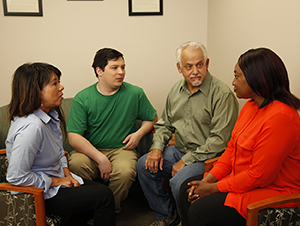Chronic Lung Disease: Coping Tips for Caregivers
When someone you love has chronic lung disease, such as chronic obstructive pulmonary disease (COPD), it can change both of your lives. As a caregiver, you may have to support your loved one in new ways. This may be true whether you are caring for your spouse, your partner, a family member, or a friend. Learning some ways to cope can help you and your loved one.
Coping with your emotions
It’s normal to feel a range of emotions. You may feel sad or afraid. At times, you may be angry or frustrated. It’s important to accept these feelings. They're normal. If you find yourself feeling stressed, anxious, or depressed, get help by reaching out to family members or friends. Also speak with a healthcare provider. They can refer you to a counselor and other support services.

Taking care of yourself
Take time to manage your health and to refresh your mind and spirit. This gives you the energy to do your daily routine. Here are some basics that are important to your health:
-
Get enough sleep. Aim for 8 hours a day. Keep naps short so you can sleep at night. Limit alcohol and caffeine. These can affect how well you sleep.
-
Eat right. What you eat affects how you feel. Don’t skip meals. Eat balanced meals with whole grains, fruits and vegetables, and low-fat meat and dairy products.
-
Exercise. Try for at least 30 minutes of physical activity a day. Breaking up your activity into 3 10-minute sessions can make it easier.
Making time for you
Your needs are also important. Give yourself permission to have a life of your own. Take breaks from caregiving to relax and have fun. Here are some suggestions:
-
Share a meal with a friend.
-
Think about ways to relax. Take a walk, try yoga, deep breathing, or meditation.
-
Create a space in your home where you can be alone when needed.
-
Try to get away, even if it's just for a short time. Go to a friend's house, or take a drive or a long walk.
Accepting help
You may need help with caregiving. Knowing you can count on others can be a relief. Keep these tips in mind:
-
Make a list of things other people can help with. Ask family and friends to handle tasks, such as running errands, giving rides, or making meals.
-
Make use of adult daycare and respite services, home meal services, and home health aide programs. These provide short-term (temporary) care for your loved one, when needed. Check online for local organizations.
Support groups
Look for resources in your area:
-
There may be a support group for people with chronic lung disease and their caregivers. This can help you feel that you’re not alone. You’ll learn coping strategies. And you'll get advice from others going through the same things you are.
-
Religion and faith-based organizations may be a source of strength and support for you also. Reach out to a leader in your faith community to discuss your spiritual needs.
-
Find local support groups and an online support community at the American Lung Association at www.lung.org/help-support.
Online Medical Reviewer:
Chris Southard RN
Online Medical Reviewer:
Jessica Gotwals RN BSN MPH
Online Medical Reviewer:
Rajadurai Samnishanth Researcher
Date Last Reviewed:
9/1/2024
© 2000-2026 The StayWell Company, LLC. All rights reserved. This information is not intended as a substitute for professional medical care. Always follow your healthcare professional's instructions.